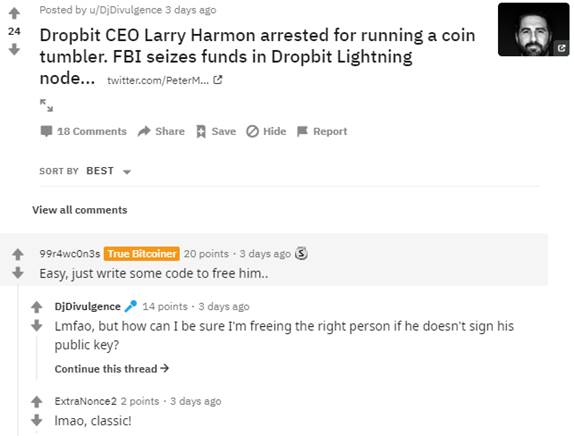|
Getting your Trinity Audio player ready...
|
As we mentioned a few days ago, Ohio resident Larry Dean Harmon was arrested and charged last week after operating the Helix coin mixing (or coin tumbling) service, and the Grams darknet market search engine. This reminds us of two things: that operating such Bitcoin mixers are illegal even if you don’t touch illicit goods directly, and that Bitcoin is not for anonymous transactions—nor was it ever intended to be.
Harmon has been indicted for money laundering conspiracy, operating an unlicensed money transmitting business and conducting money transmission without a District of Columbia license (even though he didn’t live in D.C.). The government didn’t need new laws to make the arrest, they’ve existed for a long time.
As one wag wrote on Reddit: “Easy, just write some code to free him.” This is a shot at the “code is law” belief common in some cryptocurrency and crypto-anarchist circles. Code may occasionally permit circumvention of human laws—but those enforcing human laws and the people who break them still live in the human world, where there are mechanisms to apply other kinds of pressure.

Cryptocurrencies are no safe haven
Many have operated under the false belief that Bitcoin and other cryptocurrencies offer some kind of safe haven from the law. Coin mixers and darknet markets are two products of this belief.
If anything, the protection they offered was “security through obscurity”—that is, their use wasn’t widespread enough, or enough of a problem, for law enforcement to worry about them. But that has changed in the past few years, and cases like Harmons are evidence they are now taking a tougher approach. And Bitcoin, remember, has a permanent public ledger of all transactions.
Dr. Craig Wright, who created Bitcoin, has warned for a long time that this is a misunderstanding of its purpose and functionality. Using Bitcoin to engage in financial and other crimes, he has said, will result in arrest and punishment eventually. Many, from seasoned and experimental criminals to libertarian utopians, are facing trial or lengthy sentences. They might have lived better with a more realistic understanding of what Bitcoin really is, or paid more attention to those who tell them.
In December 2019, Dr. Wright clarified that Bitcoin offered privacy, but not full anonymity:
Instead of anonymity, Bitcoin offers privacy. This means your identity isn’t always revealed, but there’s an audit trail should anyone want (or need) to investigate wrongdoing.
This would lead to a return to “old fashioned policing” that required investigation, he said, adding that Bitcoin’s rules would apply to everyone, from common criminals to corrupt politicians.
He has also warned that other, so-called “Bitcoin” networks, like BTC’s Lightning Network and BCH were encouraging use for illegal activities by promoting anonymity features. These would eventually lead to law enforcement action.
BTC uses Lightning Network to process smaller transactions due to its deliberately-limited on-chain transaction capacity. It is an entirely separate protocol to BTC, where nodes bundle transactions and “settle” them later on the main chain.
Lightning Network doesn’t have anonymity per se, but protocols like Sphinx add a Tor-like communications routing capability. It’s been reported that members of Lightning Labs’ and Blockstream’s (which funds Bitcoin Core/BTC development) teams have worked with Sphinx developers to make Sphinx more usable with Lightning Network.
Developers have implemented Schnorr signatures on the BCH protocol, and tout it as a way to increase privacy (whether it offers any degree of anonymity or not has yet to be seen). Then there’s Zcash and Monero, whose entire reason for existing is anonymous transactions and balances—but that can come with its own set of problems.
Full anonymity leads to corruption
With so many technological intrusions into our personal lives, it’s easy to be lured by promises of privacy and anonymity. But there’s also a misunderstanding of what these two terms actually mean.
Some in Bitcoin fear that auditability will lead to coin “tainting”, where coins that have at some time been involved in criminal activity will be forever marked. If you happen to receive one in the future, you could be subject to scrutiny or worse, despite not having anything to do with the original crime.
We all need a degree of privacy in our lives, and feel it’s slipping away. Most people wouldn’t put a camera in their shower. You don’t need your annual salary to be available on the public record (though interestingly, those in senior government positions often do). It’s easy to see the lure of anonymity if it means fewer people poking around in your business.
But it goes both ways. Privacy is important, but so is transparency and auditability. Society could not function if true anonymity were possible and real identities could always be hidden. The lead character in “The Invisible Man” becomes corrupted by the power of full anonymity and the resulting lack of accountability gives him. Crime, scams and corruption would run rampant if everyone used anonymous cryptocurrency—just look at the various attempts in the past decade.
Warning shot to coin mixers and coin tumbler users
In arresting Larry Dean Harmon, law enforcement has issued a warning to those who operate coin mixing services. This could (and will probably) extend to those who use them as well.
Even if they weren’t illegal, trusting coin mixers is a bad idea in general. Bitcoin history is riddled with scam/copycat sites, seizures and shutdowns, exit scams and lost funds—all from people who sent their coins into the ether and crossed their fingers. BitcoinTalk publishes a list of popular mixers, but that’s no guarantee the sites on the list are 100% trustworthy, only that some users had some luck with them. The list of “mixers to avoid” is longer.
You also take a punt on how well a mixer actually “works”. It might not mix coins better than forensics crews can track them, or it may be a law enforcement honeypot like some darknet marketplaces have been. It’s not like these services are auditable, have reliable tech support, or actual people you can track down to make a claim.
Thinking that Bitcoin or any other cryptocurrency will ever offer immunity from law enforcement action is naive. Even in the world economy as it exists today we have black market money changers, tax shelters, hawala networks, casino junkets, money laundering, and other tricks. New technology and techniques may be a cat and mouse chase, but the cat usually wins those eventually (except in cartoons).
“Anonymous” cryptocurrencies like Monero or Zcash can only go so far too. If they can’t trace the transactions themselves, regulators will choke the entry and exit points—like exchanges, apps, bank transfers, etc. Again, human law can put pressure on humans regardless of the code they’re running.
That’s why Bitcoin SV is designed to be fully compliant with national financial regulations—because Bitcoin must be to survive.
Dr. Wright has warned that further action will take place against those providing anonymous transactions, in 2020 and into the future. Given that his past warnings have a tendency to come true, it’s a good idea to heed them.

 02-21-2026
02-21-2026 




